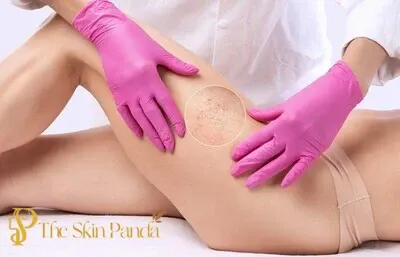Have you ever wondered if the quest for smooth, hair-free skin through laser hair removal comes with a hidden risk? Join us as we explore the intriguing question: Does laser hair removal cause cancer? Let’s dive into the science, separate fact from fiction, and uncover the truth together. Are you ready?
In recent years, laser hair removal has become an increasingly popular choice for individuals seeking a more permanent solution to unwanted hair. The promise of smooth, hair-free skin without the constant need for shaving or waxing has made this cosmetic procedure a go-to option for many.
However, amidst the buzz and convenience, questions and concerns have arisen about the safety of laser hair removal, particularly regarding its potential to cause cancer.
The information provided here aims to shed light on the topic and separate fact from fiction. We will delve into the science behind laser hair removal, explore the rumors about cancer risks, examine the available scientific evidence, and provide expert insights to help you make an informed decision about this widely practiced procedure.
So, let’s embark on a journey to uncover the truth behind the myth: Does laser hair removal cause cancer?
Understanding Laser Hair Removal
Before delving into the safety concerns surrounding laser hair removal and its alleged links to cancer, it’s essential to have a solid understanding of how this procedure works and its widespread adoption in the realm of cosmetic treatments.
A) How Laser Hair Removal Works
Laser hair removal is a non-invasive cosmetic procedure designed to permanently reduce unwanted hair growth. At its core, it operates on the principle of selective photothermolysis, a process where a specific target, in this case, the melanin (pigment) in hair follicles, is exposed to laser light. Here’s a brief overview of the key steps:
1. Melanin Absorption: The laser emits a concentrated beam of light, which is absorbed by the melanin in the hair shaft and follicle. Melanin is particularly efficient at absorbing the laser’s energy.
2. Heat Generation: As the laser energy is absorbed, it transforms into heat. This heat damages the hair follicle’s ability to regrow hair while leaving the surrounding skin largely unaffected.
3. Permanent Hair Reduction: Over a series of treatment sessions, the targeted hair follicles become progressively disabled, leading to a significant reduction in hair growth. While it’s called “permanent hair reduction,” some hair may regrow over time, but it is typically finer and less noticeable.
B). Types of Lasers Used in Hair Removal
Several types of lasers are employed in laser hair removal, each with specific characteristics suited for different skin and hair types. The primary laser systems used include:
1. Diode Lasers: Effective for individuals with light to medium skin tones and dark hair.
2. Alexandrite Lasers: Suitable for individuals with fair to medium skin and fine to medium hair.
3. Nd: YAG Lasers: Ideal for all skin types, including darker skin tones, and coarse hair.
Choosing the right type of laser for your specific skin and hair type is crucial to ensure the procedure’s effectiveness and minimize potential risks.
C). Prevalence and Popularity of the Procedure
The popularity of laser hair removal has surged in recent years, driven by the desire for long-term hair reduction and the convenience it offers. Salons, clinics, and medical spas across the world now offer laser hair removal as a standard cosmetic treatment.
Its widespread adoption underscores the importance of addressing concerns about its safety, including the perceived risk of cancer, which we will explore in detail in the following sections.
Must Read: Does Nicotine Cause Hair Loss
The Cancer Concern: Myth or Reality?

With the prevalence of laser hair removal as a widely sought-after cosmetic procedure, questions have arisen about its potential to cause cancer. It’s essential to address these concerns and evaluate whether they are rooted in scientific evidence or mere myths.
Before delving into the scientific aspects, let’s address some of the common misconceptions and rumors surrounding laser hair removal and its alleged cancer risk:
1. Radiation Misunderstanding: One frequent misconception is that the laser used in hair removal emits harmful ionizing radiation, similar to X-rays or nuclear radiation. In reality, the lasers employed in these procedures produce non-ionizing radiation, which lacks the energy required to damage DNA and cause cancer.
2. Surface-Level Treatment: Another misunderstanding is that the laser penetrates deep into the body, potentially affecting internal organs. In truth, laser hair removal specifically targets hair follicles within the skin, with minimal penetration beyond the epidermis.
The Role of Radiation in Cancer Development
To evaluate the potential cancer risk associated with laser hair removal, it’s crucial to understand the basics of radiation and its role in cancer development:
1. Ionizing vs. Non-Ionizing Radiation: Ionizing radiation, such as X-rays and nuclear radiation, possesses enough energy to ionize atoms and molecules, potentially damaging DNA and increasing the risk of cancer. Non-ionizing radiation, like that emitted by lasers in hair removal, lacks this capability.
2. Safety Measures: Laser hair removal devices are designed with safety in mind, utilizing specific wavelengths and energy levels that are carefully controlled to target hair follicles without causing harm to surrounding tissues.
Expert Opinions and Official Statements
Numerous medical and health organizations have weighed in on the safety of laser hair removal and its potential link to cancer. These statements and expert opinions provide valuable insights:
FDA: The U.S. Food and Drug Administration (FDA) has approved specific laser devices for hair removal and considers them safe and effective when used by trained professionals according to established guidelines.
Dermatologists and Medical Experts: Dermatologists and medical professionals with expertise in laser hair removal generally regard the procedure as safe and effective for hair reduction without a significant risk of cancer.
Does Laser Hair Removal Cause Cancer in the Skin

Laser hair removal is a cosmetic procedure that primarily targets hair follicles beneath the skin’s surface, using laser energy to disable them and reduce hair growth. The procedure is not associated with the development of skin cancer for several reasons:
1. Non-Ionizing Radiation: The lasers used in hair removal emit non-ionizing radiation, which lacks the energy to damage DNA and trigger cancerous changes. Unlike ionizing radiation (e.g., X-rays), non-ionizing radiation does not carry the risk of causing mutations in cells.
2. Targeted Treatment: Laser hair removal devices are designed to selectively target the melanin (pigment) in hair follicles. They do not penetrate deeply enough to affect the DNA in skin cells or cause genetic mutations.
3. Safety Regulations: Regulatory bodies, such as the U.S. Food and Drug Administration (FDA), have established strict safety guidelines for laser hair removal devices. Approved devices are considered safe for use when operated by trained professionals according to established protocols.
4. Expert Consensus: Dermatologists and medical professionals specializing in laser procedures generally regard laser hair removal as a safe and effective method for hair reduction without a significant cancer risk.
It’s essential to choose a reputable clinic or provider for laser hair removal and to follow pre-treatment and post-treatment care instructions to minimize any potential side effects.
Additionally, if you have concerns about the procedure’s safety or its suitability for your skin type, it’s advisable to consult with a qualified dermatologist or medical professional who can provide personalized guidance and address your specific questions and concerns.
Does Home Laser Hair Removal Cause Cancer

There is no scientific evidence to suggest that at-home laser hair removal devices cause cancer. These devices typically use lower-energy lasers or intense pulsed light (IPL) technology compared to professional-grade equipment used in clinics or medical spas.
It’s important to note that at-home laser hair removal devices are designed for consumer use and are subject to regulatory oversight by relevant authorities in different countries. While they may not be as powerful as professional devices, they are intended to provide effective hair reduction when used as directed.
The non-ionizing radiation emitted by at-home laser hair removal devices is not associated with the type of radiation that can damage DNA and potentially lead to cancer. These devices are generally considered safe when used according to the manufacturer’s instructions.
However, it’s crucial to follow all safety guidelines provided by the manufacturer, including conducting a patch test on a small area of skin before full treatment, to ensure that your skin does not react adversely to the device.
Additionally, if you have any concerns about the safety of using an at-home laser hair removal device, it’s a good practice to consult with a healthcare professional or dermatologist for personalized guidance.
Does Underarm Laser Hair Removal Cause Breast Cancer

Laser hair removal is a cosmetic procedure that targets hair follicles beneath the skin’s surface using non-ionizing radiation, which lacks the energy to damage DNA or increase the risk of cancer.
The underarm area is a common location for laser hair removal, and the procedure primarily affects the hair follicles in that region. It does not involve exposure to the breast tissue or any direct influence on breast health.
Breast cancer is a complex disease with numerous risk factors, including genetics, hormonal influences, lifestyle factors, and family history. While maintaining overall health and well-being is important for reducing the risk of cancer, there is no established link between laser hair removal in the underarm area and the development of breast cancer.
If you have specific concerns about breast health or the safety of laser hair removal in relation to breast cancer, it’s advisable to consult with a healthcare professional or dermatologist who can provide the most up-to-date information and address your individual concerns.
Does IPL Laser Hair Removal Cause Cancer

IPL devices, like traditional laser hair removal devices, use non-ionizing radiation to target hair follicles, which lack the energy required to damage DNA and trigger cancerous changes.
IPL hair removal is generally considered a safe and effective method for reducing unwanted hair when used correctly and following manufacturer guidelines.
These devices are designed for consumer use and have been subject to regulatory oversight by relevant health authorities in different countries.
However, it’s crucial to use IPL devices as directed by the manufacturer and to conduct a patch test on a small area of skin before starting full treatment to ensure your skin does not react adversely.
Following safety instructions and recommendations, such as wearing protective eyewear provided with the device and avoiding sun exposure before and after treatment, is essential to minimize potential side effects and risks.
If you have specific concerns about the safety of IPL hair removal, consulting with a healthcare professional or dermatologist is advisable for personalized guidance and peace of mind.
Common Side Effects and Risks of Laser Hair Removal

While laser hair removal is generally considered safe, like any medical or cosmetic procedure, it is not entirely risk-free. Understanding the potential side effects and risks associated with laser hair removal is essential for informed decision-making and proper post-treatment care.
1. Redness and Irritation: After a laser hair removal session, it’s common to experience redness and mild irritation in the treated area. This typically resolves within a few hours to a couple of days.
2. Swelling: Some individuals may notice slight swelling around the hair follicles immediately after treatment, but this is usually temporary.
3. Temporary Pigmentation Changes: Alterations in skin pigmentation, such as darkening or lightening of the treated area, can occur. However, these changes are usually temporary and tend to fade over time.
4. Discomfort: During the procedure, you may feel a sensation often described as a mild snapping or stinging. Providers often use cooling techniques to minimize discomfort.
Addressing Concerns Related to Skin Damage and Pigmentation Changes
Skin Damage: While rare, excessive exposure to laser energy or using the wrong type of laser for your skin type can potentially cause skin damage. This underscores the importance of selecting a qualified and experienced provider who can tailor the treatment to your specific needs.
Hyperpigmentation: Darkening of the skin (hyperpigmentation) can occur, particularly in individuals with darker skin tones. It’s essential to follow post-treatment care instructions and protect the treated area from excessive sun exposure to minimize this risk.
Also Read: Hyperpigmentation Tretinoin Before and After
Hypopigmentation: Lightening of the skin (hypopigmentation) is also possible, but it is less common. It may occur when the laser energy affects melanin production. Like hyperpigmentation, hypopigmentation can often resolve over time.
Rare Complications and Their Prevention
While severe complications are exceedingly rare in laser hair removal, it’s still important to be aware of potential risks:
Blistering: In some cases, blistering of the skin may occur, particularly if the laser is not appropriately calibrated or if post-treatment care instructions are not followed.
Scarring: Although extremely rare, scarring can occur if the skin is damaged during the procedure. This risk is minimized by selecting a qualified provider and following recommended guidelines.
To minimize the risk of side effects and complications:
1. Choose a reputable provider with experience in laser hair removal.
2. Follow pre-treatment and post-treatment care instructions diligently.
3. Be honest about your medical history and any skin conditions during the consultation.
4. Avoid sun exposure before and after treatment to reduce the risk of pigmentation changes.
Consider doing a patch test on a small area to assess your skin’s reaction before undergoing a full treatment session.
Safety Measures and Regulations

Ensuring the safety of laser hair removal procedures is of paramount importance. Regulatory bodies and industry guidelines exist to safeguard patients and clients undergoing these treatments.
Here, we explore the safety measures and regulations in place to maintain the integrity of laser hair removal as a cosmetic procedure.
A). FDA Regulations and Approvals
In the United States, the U.S. Food and Drug Administration (FDA) plays a central role in regulating medical devices, including those used in laser hair removal. Key points regarding FDA regulations include:
1. Device Approval: Laser hair removal devices must receive FDA clearance or approval before they can be legally marketed and used for hair removal purposes. This approval process involves rigorous testing to ensure safety and efficacy.
2. Clearance for Specific Uses: The FDA typically clears or approves devices for specific indications and skin types. Providers should use these devices in accordance with the FDA’s clearance and label instructions.
3. Ongoing Monitoring: The FDA continues to monitor the safety and performance of laser hair removal devices and may take action if any safety concerns arise.
B). Importance of Choosing a Certified and Reputable Clinic
When considering laser hair removal, selecting a reputable clinic or provider is essential for your safety. Here are some critical considerations:
1. Certification and Licensing: Ensure that the clinic and its practitioners are appropriately certified and licensed to perform laser hair removal procedures. Certification from organizations such as the American Board of Dermatology or the American Society for Laser Medicine and Surgery is a positive sign.
2. Professional Expertise: Seek practitioners with experience and expertise in laser hair removal. Dermatologists and licensed medical professionals often have specialized training in using these devices safely.
3. Client Assessments: Reputable providers conduct thorough pre-treatment assessments to evaluate skin type, hair color, and medical history. This helps determine the most appropriate laser and treatment plan for each client.
C). Pre-Treatment Assessments and Consultations
Before undergoing laser hair removal, clients should expect a comprehensive pre-treatment assessment and consultation, which includes:
1. Skin Type Evaluation: Assessing skin type is crucial to determine the most suitable laser type and settings. Different lasers are more effective and safer for specific skin tones.
2. Hair Color Assessment: The color and thickness of the hair being treated play a role in selecting the appropriate laser technology.
3. Medical History Review: Providers should inquire about any medical conditions, medications, or skin sensitivities that might impact the treatment or pose additional risks.
4. Realistic Expectations: Clients should have a clear understanding of what to expect during and after the procedure, including potential side effects and the number of sessions required for desired results.
By adhering to these safety measures and regulations, individuals can minimize risks associated with laser hair removal and ensure a safe and effective treatment experience.
Tips for Safe Laser Hair Removal

Ensuring a safe and successful laser hair removal experience requires careful consideration and preparation.
Here are some essential tips to help you navigate the process and achieve the best results while minimizing potential risks.
A. Pre-Treatment Skincare Routines
1. Avoid Sun Exposure: Minimize sun exposure to the treatment area for at least six weeks before your session. Sunburned or tanned skin is more susceptible to laser-related complications and pigmentation changes.
2. Shave the Area: Trim or shave the area to be treated a day or two before your session. This ensures that the laser energy is focused on the hair follicles rather than the hair on the surface.
3. Stay Makeup-Free: If you’re receiving treatment on your face, arrive at the appointment without makeup or creams. Clean, makeup-free skin allows for better treatment results.
B. What to Expect During the Procedure
2. Mild Discomfort: Expect to feel a mild snapping or stinging sensation during the procedure. Many providers use cooling techniques to make the experience more comfortable.
2. Protect Your Eyes: Your provider will likely provide protective eyewear to shield your eyes from the laser’s light. Ensure you wear this eyewear throughout the treatment.
3. Duration: Laser hair removal sessions can vary in length depending on the size of the treatment area. Smaller areas, like the upper lip, may take just a few minutes, while larger areas, such as the legs, can take longer.
C. Post-Treatment Care and Maintenance
1. Follow Post-Treatment Instructions: Your provider will give you specific post-treatment care instructions. Follow these diligently to reduce the risk of side effects and enhance results.
2. Avoid Sun Exposure: After treatment, protect the treated area from sun exposure. Use sunscreen with high SPF and wear protective clothing if necessary.
3. Avoid Hot Baths and Saunas: Hot water can irritate the treated area, so it’s advisable to avoid hot baths and saunas for a few days after your session.
4. Skip Waxing and Plucking: During your laser hair removal treatment plan, avoid waxing or plucking the treated area, as these methods temporarily remove hair follicles, making laser treatment less effective.
5. Stay Hydrated: Proper hydration can help your skin recover more efficiently after treatment.
People Also Ask (FAQs)
Question 1. Does Laser Hair Removal Increase the Risk of Cancer?
Answer: Concerns about laser hair removal increasing cancer risk are unfounded. Scientific evidence and expert consensus confirm that this widely-used cosmetic procedure is safe, targeting hair follicles without posing cancer risks. Enjoy the benefits of smoother skin without worry.
Question 2. Are there Health Risks to Laser Hair Removal?
Answer: Laser hair removal is generally safe, but like any medical procedure, it has potential risks. Common side effects include temporary redness and skin irritation. To minimize risks, choose a reputable provider, follow safety guidelines, and discuss any concerns with a healthcare professional.
Question 3. Is Laser Hair Removal Harmful Long-Term?
Answer: Laser hair removal is not considered harmful in the long term when performed by trained professionals using approved devices. The procedure is designed for long-lasting hair reduction, with minimal and temporary side effects. Consult with a qualified provider to address any concerns and ensure a safe, effective experience.
Question 4. Does Laser Hair Removal Cause Infertility?
Answer: Laser hair removal is a localized cosmetic procedure that does not impact fertility. The treatment targets hair follicles beneath the skin’s surface, far from reproductive organs. Rest assured, there is no scientific evidence linking laser hair removal to infertility.
Question 5. Can you get HPV from Laser Hair Removal?
Answer: Laser hair removal does not transmit HPV (Human Papillomavirus). HPV is a sexually transmitted infection, and laser hair removal is a non-invasive cosmetic procedure targeting hair follicles, unrelated to viral infections. Maintaining proper hygiene and practicing safe sex are key for HPV prevention.
Conclusion
In the quest for smoother, hair-free skin, the topic of whether laser hair removal causes cancer has been a point of concern and confusion. It is clear that laser hair removal, when performed by trained professionals and adhering to safety guidelines, is not associated with an increased risk of skin cancer.
Laser hair removal has become a popular and effective method for achieving long-term hair reduction, offering individuals a convenient alternative to traditional hair removal methods. However, like any medical or cosmetic procedure, it does come with potential side effects and risks, primarily mild and temporary in nature.
Understanding the importance of safety measures, including FDA regulations, choosing a certified and reputable provider, and following pre-treatment and post-treatment care instructions, is essential to ensure a safe and successful experience.
As you embark on your laser hair removal journey, remember that it is a process that typically requires multiple sessions for optimal results. Patience, commitment, and open communication with your provider will contribute to a positive outcome.
Ultimately, laser hair removal remains a safe and effective method for achieving hair reduction and smoother skin. By staying informed and taking appropriate precautions, you can confidently embrace this popular cosmetic procedure and enjoy the benefits of long-lasting hair-free skin without the fear of cancer risks.
Disclaimer
The information provided is intended for general informational purposes only and should not be considered a substitute for professional medical or legal advice. Scientific knowledge and regulations may have evolved since that time, and individual circumstances can vary. For the most current and tailored guidance, consult with qualified professionals in the relevant field.
